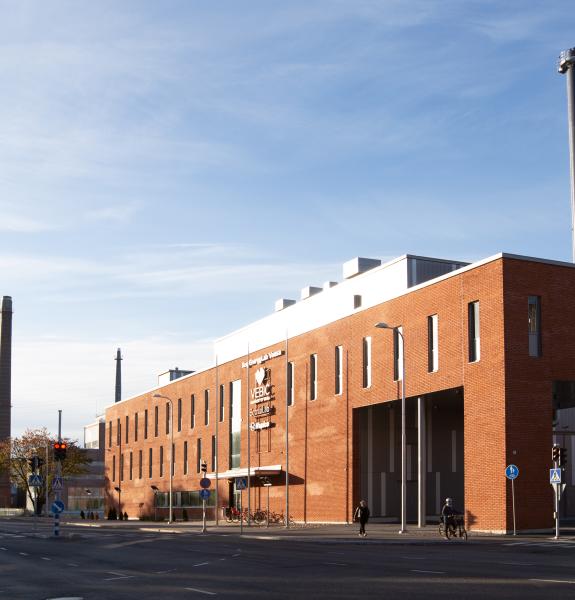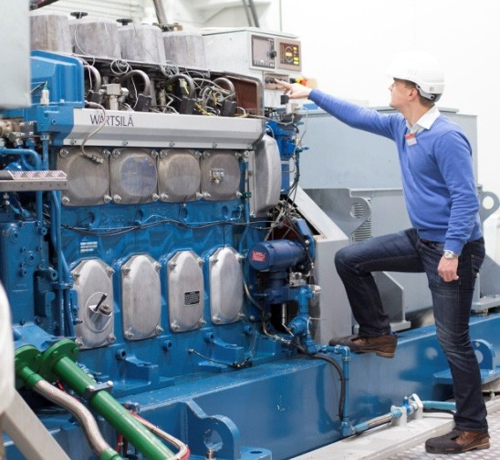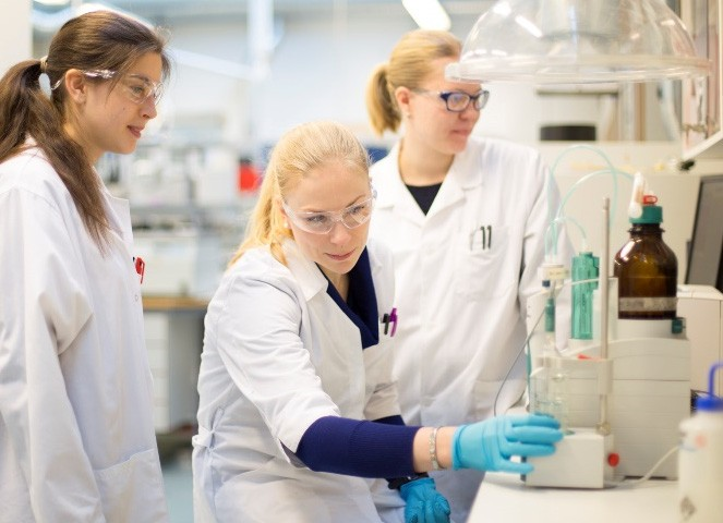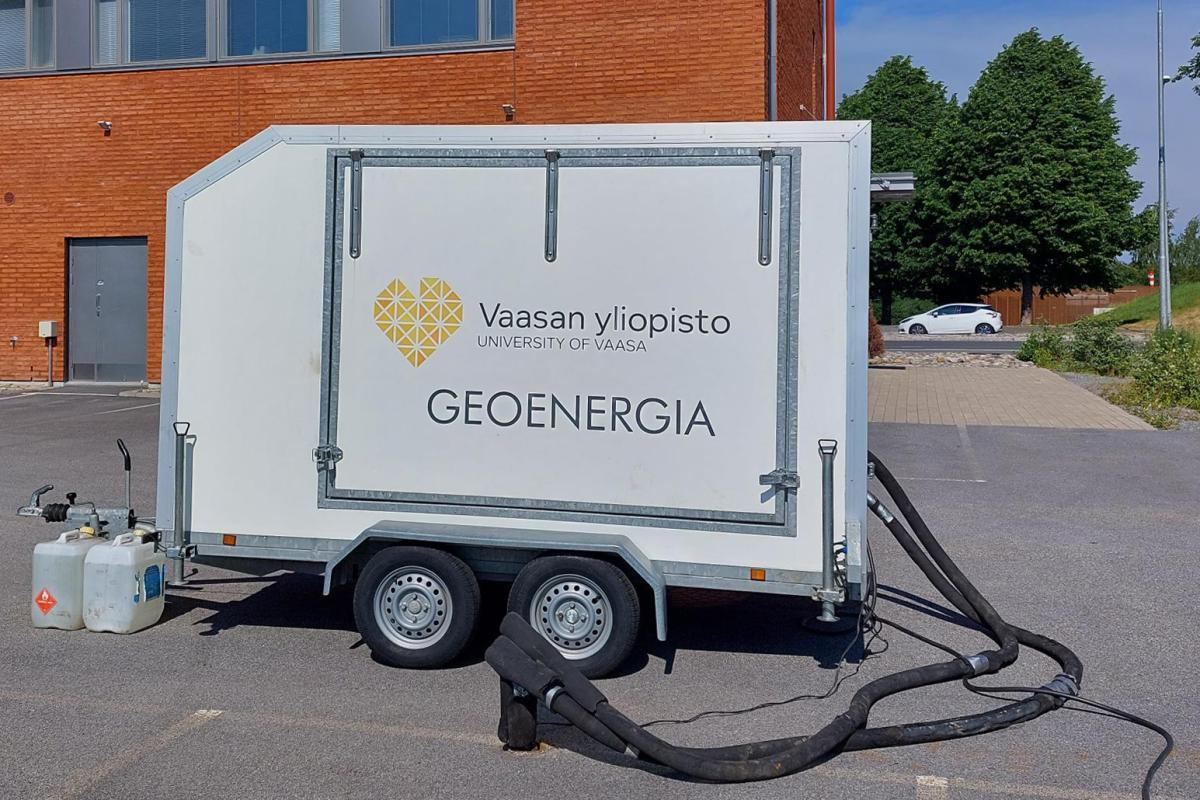Energy Laboratories

Internal Combustion Engine Laboratory and Fuel Laboratory
The Internal Combustion Engine (ICE) and Fuel Laboratories at the University of Vaasa form a unique research environment for developing future low-emission engine technologies and studying renewable fuels. In addition to basic engine performance parameters, the laboratories enable analysis of fuel combustion, measurement of various gaseous emissions, and determination of particulate emissions—both in terms of number and mass. The measurement equipment is comprehensive, and the university also utilizes modeling and simulation software for studying engines and energy production systems. The laboratories provide research services for companies, research institutes, and other universities.
The Internal Combustion Engine (ICE) Laboratory includes several research engines, such as Wärtsilä’s single-cylinder W20 engine, the W4L20 engine, and AGCO Power’s single cylinder SIRU, Spark Ignited Research Unit, and four-cylinder 49HD StageV engine, along with a comprehensive electrical and automation system. The W4L20 engine is loaded by an ABB alternator that generates electricity for the Vaasa power grid. The engine is controlled using a model-based Speedgoat control system, and an ABB frequency converter enables operation at variable speeds. The exhaust system is designed to allow the integration of various exhaust cleaning technologies.
The Fuel Laboratory is a research facility specializing in the analysis of liquid fuels. Its goal is to support the energy transition and enable the testing and validation of future fuels. The laboratory works closely with the ICE Laboratory and regional chemical laboratories. Its analysis methods include viscosity, density, oxidation stability, and elemental composition. In addition to research projects, the laboratory provides customer services ranging from single analyses to larger projects. Ask for more information: fuellab@uwasa.fi.

Internal Combustion Engine Laboratory and Fuel Laboratory
- Wärtsilä single cylinder and 4L20 engines for research use
- Agco Power SIRU single cylinder and 49HD StageV engines for research use
- Large electric equipment:
- Alternators
- Frequency converters
- Transformers
- Gen-set automation system
- Data acquisition system: Dewesoft
- Fuel laboratory works in close cooperation with the engine laboratory and regional chemistry laboratories
- Unique combination of fuel and engine research
Analyses (Fuel-lab)
- Oxidation stability index, EN 14112, EN 15751
- Density, ASTM D7042
- Kinematic viscosity, ASTM D7042
- Acid number, EN 14104
- Surface tension, manufacturer’s device
- Ester content, EN 14103
- Trace elements, ICP OES, EN 14538 and manufacturer’s device
- Ca, K, Mg, Na, P, Al, Cu, Fe, Mn, Si, V, Zn, Pb, S
- Flash point, EN 2719 + others
- Cold filter plugging point, EN 116
- Cloud point, EN 3015
- Pour point, EN 3016
- Distillation curve, EN ISO 3405 + others
- Cetane index, EN ISO 4264
Research focus, ICE-lab and Fuel-labl
- Flexible hybrid power generation
- Fuel flexibility, renewable fuels and blends, combustion
- Improvement of energy economy and emissions performance
- Improved electric equipment and automation of engine-driven power plants
- Validation of new systems
- Research services for the academic community, companies and research institutes

Contact persons of ICE-lab and Fuel-lab
Katriina Sirviö
Geoenergy Laboratory
Within the Geoenergy Laboratory, there is mobile research equipment suitable for various field measurements. The DTS measurement device (distributed temperature sensing with fibre optics) has been used to study heat transfer, for example, in sediment and asphalt fields. The TRT carriage has been constructed for testing the thermal response of boreholes and other shallow geothermal sources. These mobile research devices enable on-demand research anywhere in Finland.
Geoenergy Laboratory equipment
- TRT (thermal response test) carriage:
- heating power at 1 kW intervals in the 18 kW power range
- frequency inverter controlled circulator
- electrical connection 32A / 400V 3~
- length of measuring pipes ca. 4 m
- measurement technology implemented with sensors connected to the serial bus
- data transmission by computer and wireless router
- remote measurement control
- heat pump allows two-way testing
- weather station
- DTS (distributed temperature sensing) device
- spatial resolution 1 m
- temperature resolution <0.01°C
- Pyranometer
- Water heat exchanger
Key research areas of the Geoenergy Laboratory
- Heat transfer
- Heat storage
- Sector coupling
- Thermal response tests for dimensioning energy well fields
- basal temperature of the bedrock and thermal conductivity, thermal resistance and diffusion coefficient of the energy well
- Simulations


